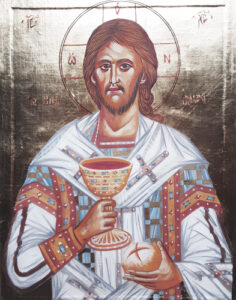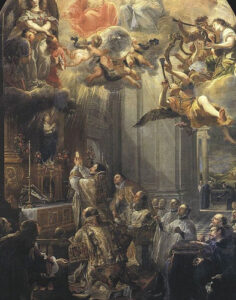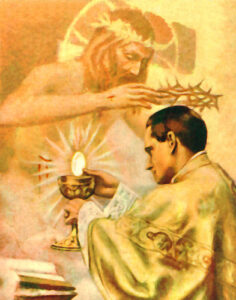Sunday of the Fourteenth Week of Ordinary Time – Year A
Zec 9:9-10, Ps 145:1-2, 8-9, 10-11, 13-14, Rom 8:9, 11-13, Mt 11:25-30
As some of you may know, I am originally from Michigan, and sometimes when I go home, I stay at the rectory of the parish where I grew up. We’re blessed to have a number of priests living there, including the chaplain for a major university hospital system. The first time I saw him when I was back home, I asked him how his day was, and he just answered, “Usually when people ask that, I ask them if they really want to know.” And then he proceeded to tell me the highlights: visits to the sick and the dying, young patients who would die in the near future, the suffering of their parents and families, all of it a very heavy burden for the patients, for their families, and for him. When he finished, he added, very quietly, “When I get to heaven, the first thing I will do is ask God, ‘Why?’”
This is the question we’re faced with in light of today’s Gospel. All of us have lived through difficult moments, and maybe even some of us are living through them now. Life is trying, and yet at the end of today’s Gospel, Jesus gives us three very comforting, but also very perplexing verses. He tells us, “Come to me, all you who labor and are burdened, and I will give you rest. Take my yoke upon you and learn from me, for I am meek and humble of heart; and you will find rest for yourselves. For my yoke is easy, and my burden light.”
The answer lies, at least in part, in the very specific words that Christ uses in these verses, words that are very difficult to translate into English. Let’s consider just three of these words, meek, easy, and yoke, and see how they can shed light on the difficulties we experience in this life and how God is present to us in the midst of them. Again, meek, easy, and yoke.
First, Jesus tells us that “He is meek,” and because of this, we should accept His yoke. That word translated as meek is πραΰς [praus] in Greek; it uses a very difficult-to-translate root (pra-) which means more than just “meek” in the English sense. Usually when we say someone is meek, we mean that they’re quiet, or submissive, or timid. The word in Greek, though, makes reference to power and to strength, but a strength that’s kept under very careful control.[1] In fact, that “word . . . was used by the Greeks to describe a horse that had been broken.” The wild horse that was once powerful, wild, and uncontrolled, remains powerful even when broken, but now it is reserved and that power is directed. “It refers to power under control.”[2]
This meekness of Christ’s heart, then, is not a weakness or a being timid, but rather means that He exercises all His strength but under control; He shows and uses His power without undue harshness. God permits what He knows we can handle, nothing more, but oftentimes not a whole lot less either. It’s at the limit, the maximum. Jesus is meek, even in the difficult moments, because He knows what it is we can handle, and, like a strong medicine, He gives us the maximum dose so we can become saints, which is what will truly make us happy. Do we really trust in Him and in His meekness?
The second complicated word is easy. Christ tells that we will find rest because “His yoke is easy.” The Greek word for easy is χρηστός [chréstos]. Literally the word can mean “well-fitting,” and to understand this better the historical context is very important. In Biblical Palestine, yokes were made from wood, and the process to make one was very involved: the ox would need to be taken to the carpenter and measured. A rough model of the yoke was made, and the ox would be brought back to try it on. Lastly, the carpenter would make the final precise adjustments so that it would sit perfectly on the ox, and not rub at all or cause any sort of discomfort for the animal. “The yoke, [then], was tailor-made to fit the ox,”[3] and was more like a custom-made suit or dress than some mass-produced artifact.
Jesus says, “My yoke fits well.” What he means is: “The life I give you, with all its difficulties, with all its challenges and rough parts, isn’t something that’s meant just to hurt you or make you suffer; rather, your task, your duties, your calling, your life, is made exactly for you, to get you from this earth, to heaven.” Whatever God sends us is made to fit our needs and our abilities exactly.
In beautiful words Saint Louis de Montfort explains just how tailor-made the yoke, or the cross, is for each one of us. Writing to his followers, he places the following words on Jesus’ lips: “‘Let him take up his cross,’ the one that is his. Let that man (or woman) so rare . . . take up his cross joyfully, embrace it lovingly, and carry it courageously on his shoulders, his own cross, and not that of another – his own cross which I, in my wisdom, designed for him in every detail of number, measure, and weight; his own cross which I have fashioned with my own hands and with great exactness as regards its four dimensions of length, breadth, thickness and depth; his own cross, which out of love for him I have carved from a piece of the one I bore to Calvary; his own cross, which is the greatest gift I can bestow upon my chosen ones on earth.”[4]
We can ask ourselves, do we see our struggles, our difficulties, and our challenges as the well-fitting yoke of Christ, as things that are meant to get us to heaven? Do we stop and think that our yoke is tailor-made for us, something God, in His infinite wisdom and love, designed for us before all ages, so that we could carry it to heaven? Or do we just complain, and ask God to remove everything that’s unpleasant from our lives?
This brings us to our last word, yoke. The Greek word for yoke is ζυγός [zugos], and it means a yoke, but a specific sort. It refers to that piece of wood that connects two animals and enables them to pull together. From here, the word often takes on a figurative meaning, and can be applied to anything that “unites (joins) two people to move and work together as one.”[5] In other words, when we accept Christ’s will for our lives, both in the sense of following the commandments and also in the sense of accepting what He sends our way, we are joined to Him. We could say that He is the other party in the yoke; He is the one who enables us to move forward and accomplish the tasks He sets before us. Of course, if we are yoked with Christ, He knows where we need to go, and He will have to do most of the work. Our task is to remove any obstacles that we put up, and then cooperate with Him as much as we can. In this way, Christ’s yoke truly becomes our yoke, and it enables Him to bring us to the heights of holiness and ultimately to heaven.
It is only by accepting what Christ sends or permits to come our way that we will truly be happy and holy. In fact, Christ subtly points this out: in the phrase “I will give you rest,” the “I” is emphatic; Christ repeats it, as it were. “I, I will give you rest,” and in this way He lets us know that apart from Him is neither happiness nor holiness. With Him, however, we find all the strength we need to continue our journey. Life is no longer a burden or a senseless mess, but rather a working together with Christ, whose power sustains us and sends us only what we can handle in perfectly measured doses, so that we can become the saints He wants us to be.
Through the intercession of Mary, Mother of Faith, for the grace to really take the meek Christ’s gentle yoke upon us, so we can learn from Him and at last enter into His rest.
[1] HELPS “Word-studies Cognate: 4239 praýs (also listed as 4239a/praupathia in NAS dictionary) – meek. See 4236 (praótēs).
This difficult-to-translate root (pra-) means more than ‘meek.’ Biblical meekness is not weakness but rather refers to exercising God’s strength under His control – i.e. demonstrating power without undue harshness.”
[2] Bible Exposition Commentary, 21.
[3] For this paragraph, see William Barclay’s commentary on Mt 11:28-30.
[4] Letter to the Friends of the Cross.
[5] HELPS Word-studies: 2218 zygós – properly, a yoke; a wooden bar placed over the neck of a pair of animals so they can pull together; (figuratively) what unites (joins) two people to move (work) together as one. [2218 (zygós) unites two elements to work as one unit, like when two pans (weights) operate together on a balance-scale – or a pair of oxen pulling a single plough.]







